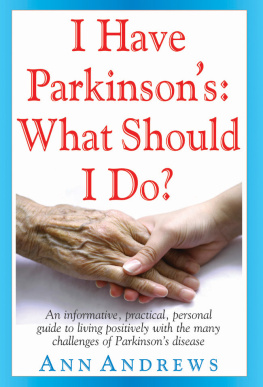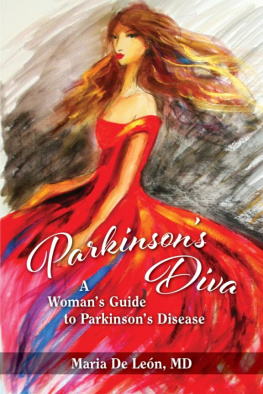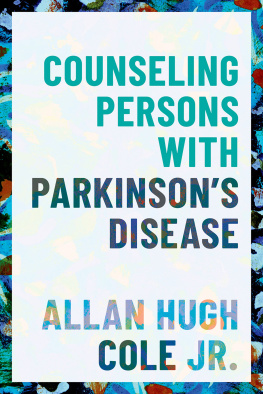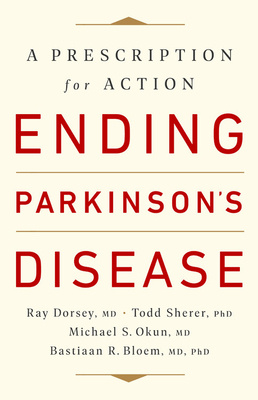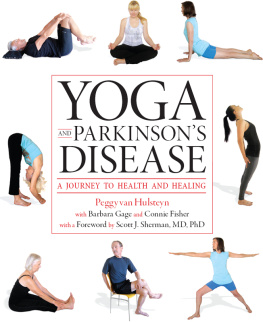By Gretchen Garie and Michael J. Church with Winifred Conkling
We would like to dedicate this book to:
Our ParentsGarrie and Mellany; Larry and Carol
Throughout our lives, you have loved us, stood by us, and continued to support us and be our biggest cheerleaders.
Our SiblingsCarol and Carrie; Wendy, Rick and Annemarie
Thank you for taking the time to understand Parkinsons disease, for advocating on our behalf, and for being there when we needed extra support.
Our ChildrenLuLaura, Christine, Michelle, Rebekah, and Michael, Jr.
We hope that we have taught you that life is 10 percent what happens to you and 90 percent how you deal with it.
Our Parkinsons Family
To those who opened their hearts and lives to share with others in this book, we thank you. To those who have come before us and who we hope will benefit from where we have been, we are honored that you are a part of our lives.
MEDICAL DISCLAIMER
This book is designed to give information on Parkinsons-related conditions, treatments, and procedures for your personal knowledge and to help you be a more informed consumer of medical and health services. It is not intended to be complete or exhaustive, nor is it a substitute for the advice of your physician. You should seek medical care promptly for any specific medical condition or problem you may have. Under no circumstances should medication of any kind be administered without first checking with your physician.
All efforts have been made to ensure the accuracy of the information contained in this book as of the date published. The authors and the publisher expressly disclaim responsibility for any adverse effects arising from the use or application of the information contained herein.
The names and identifying characteristics of individuals featured throughout this book have been changed to protect their privacy.
G retchen Garie and Michael J. Church have been my patients for more than five years. During that time, I have grown to respect their personal dedication as cofounders of the advocacy group Movers & Shakers, as well as their commitment to thriving in spite of their disease. They both willingly share their experience and expertise with those who are newly diagnosed, and they inspire all of those in the Parkinsons community to approach their lives with passion and perseverance.
In Living Well with Parkinsons Disease , Gretchen and Michael do an excellent job of describing both the physical and psychological changes that occur in a person with Parkinsons disease. Their firsthand knowledge as patients, coupled with their years of experience as experts and advocates, allows them to offer a unique perspective on the disease. Using the information provided by Gretchen and Michael in this book, you, too, can live well with Parkinsons disease.
Parkinsons disease is a difficult condition to live with, and one that requires a personalized approach to treatment. When I diagnose patients with Parkinsons disease, I know that they are taking the first steps of what will be a lifelong journey of acceptance and adjustment. The symptoms of Parkinsons diseasea progressive and degenerative disease caused by the loss of dopamine-producing cells in the braincan be controlled with medication or surgery in most cases, but at present, there is no cure.
As a neurologist with a primary focus on the diagnosis and treatment of Parkinsons disease, I am witnessing the development of many new medications and proceduressome already available and others in development or clinical trial. The future looks optimistic for the treatment of Parkinsons disease patients, despite the need for a continuing search for the cause and cure of the disease. Empowered patients such as Gretchen and Michael will add strength to this search.
J OHN D. C AMPBELL , M.D., earned his medical degree at University of Saskatchewan in Canada. He did his fellowship at Cleveland Clinic in Cleveland, Ohio. He is certified by the American Board of Psychiatry and Neurology and a member of the American Academy of Neurology and the National Parkinsons Foundation.
I was diagnosed with young-onset Parkinsons disease (YOPD) when I was 33 years old. At the time, I was living in a rural town in Tennessee, working as an autism specialist, mothering my very active preteen daughter, and trying desperately to understand why I was tired all the time and my body felt like a quivering mold of Jell-O. When the doctor finally diagnosed my condition, I felt relieved that what I was feeling had a namebut I was devastated with the reality that I faced a progressive, degenerative disease that had no cure. I had been given a life sentence with no parole.
Living in a small town with an illness such as Parkinsons was like being dropped into an Amazon tribe with no interpreter. I had no support system in my community, and my doctors were an hour away. I knew a little about Parkinsons disease (PD) because I liked Michael J. Fox, and I had read about his battle with this illness. My only other link to knowledge about PD came through the computer.
Sometimes well-intentioned friends would ask, Are you getting better?
I wanted to scream, No! Im not getting betterand I never will! Few of the people I knew understood the disease or how to be supportive of someone with a chronic illness. There were good days, when I felt almost like my old selfand there were hopeless days, when I keenly felt the loss of my former life. Most of all, I felt alone.
I was so afraid of not being able to do things with my daughter, of gradually withering away into less than I used to be. I had to remake myself and discover new sources of spiritual strength, but these things didnt happen for me overnight.
About two years into my illness, I was approached by Michael J. Church, from Naples, Florida, who had seen some of my online postings on various Parkinsons message boards. Michael was a single father of four who had been diagnosed with Parkinsons disease when he was 32 years old. He asked me if I would assist him in starting an online support group for young people with PD. We started an online group on AOL and within three months we had more than 100 members. About a year later, we decided to expand the support we were offering from the computer monitor to the living rooms of many other people. That concept evolved, and in December 2002 Movers & Shakers was born.
The mission of Movers & Shakers is simple: to support and advocate for people with young-onset Parkinsons disease. To that end, we recruit advocates from all over the country to raise awareness about Parkinsons within their states, cities, and communities, to assist people with PD in getting the treatment they need, and to help medical professionals and others learn how to work in cooperation with those of us diagnosed with this disease. We offer online support groups, patient assistance, state advocacy programs, medical equipment exchanges, assistance with local support group startups, and conferences. We want to empower others to see that there is life with Parkinsons disease; we want our lives to be testimony to the reality that people with Parkinsons can live vibrant, powerful, meaningful lives. Parkinsons does not define who we are or how we live; our hands may tremble and we may stumble and fallliterallybut we are stronger than this disease.
This book, Living Well with Parkinsons Disease , is one that Michael and I wish we could have read when we were first diagnosed. It is a comprehensive guide that provides detailed information about the medical, emotional, financial, and practical aspects of Parkinsons disease, both young-onset and the traditional form of the illness. The experience of living with PD is very different when youre diagnosed at age 34 than when you are diagnosed at age 64. This book strives to address and respect the challenges faced by people with this illness regardless of age.



